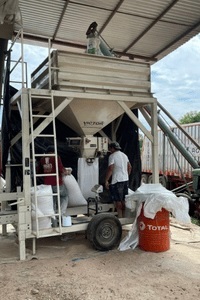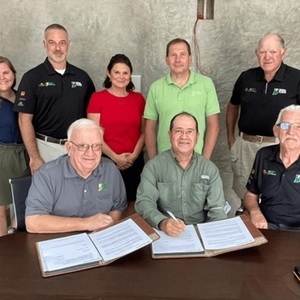USGC works to expand opportunities for DDGS in Mexico



SOURCE: U.S. Grains Council
October 7, 2022
BY U.S. Grains Council
The U.S. Grains Council recently hosted a group comprised of Indiana Corn Marketing Council representatives in Merida, Mexico, to meet with the organization’s memorandum of understanding (MOU) partner, AGRANS, a DDGS and grains merchandising company, and to witness their investment of distiller’s dried grains with solubles (DDGS) bagging equipment in action.
“This group of Indiana agriculture stakeholders had the opportunity to see their investment firsthand in the AGRANS facility’s use of the granted equipment. Individuals were given the opportunity to observe the facility’s processing systems, share their vision with the company’s leadership, and witness exactly how their equipment contribution impacted the company’s efficiency and overall ability to promote the use of more U.S. DDGS. These missions are imperative to the success of the Council, and we greatly appreciate the time and dedication of the Indiana Corn Marketing Council,” said Amelia Iliohan, USGC manager of industry relations.
The group also had the opportunity to visit with grains and DDGS customers who will benefit from Indiana’s investment. The equipment will create a more manageable bagged DDGS product for their customers to use in their operations. The Indiana growers also provided a firsthand crop report to the customers, giving them an inside look at the quality of U.S. commodities.
Advertisement
The Council has been active in promoting DDGS in Southeast Mexico for many years.
At its height, DDGS enters Mexico in bulk at 8,000-10,000 metric tons (MT) per month. From there, it is distributed to the feed industry, including major layer and broiler groups and commercial feed producers. In the last seven years, the Council has partnered with distributers who are capable of moving product into the rural ranching communities, delivering the product in bags so logistics are less of a constraint.
“As we were there, signing the MOU with AGRANS, they told us the equipment is already helping increase sales by lowering bagging costs and reaching new customers. It is a low budget investment that can help make a difference with our partners marketing DDGS,” said Javier Chavez, USGC marketing specialist in Mexico.
The Council estimates an annual average return on investment of $1,775 for the first five years of this bagging project.
Advertisement
The organization will host support programs after installation and nutritional seminars to help ensure AGRANS customers understand how to best use DDGS. These programs are meant to leverage capital investment by working to maximize inclusion rates and provide value back to U.S. agriculture and its farmers.
“We need to be creative to find ways to enable business in the region and make this type of investment while our partners also show a commitment to our farmers,” Chavez said.
Related Stories
Neste and FedEx, the world’s largest express cargo airline, have agreed on the supply of 8,800 metric tons (more than 3 million gallons) of blended Neste MY Sustainable Aviation Fuel to FedEx at Los Angeles International Airport (LAX).
The U.S. EPA on May 14 delivered two RFS rulemakings to the White House OMB, beginning the interagency review process. One rule focuses on RFS RVOs and the other focuses on a partial waiver of the 2024 cellulosic RVO.
The U.S. EPA on May 15 released data showing nearly 1.79 billion RINs were generated under the RFS in April, down from 2.09 million generated during the same month of last year. Total RIN generation for the first four months of 2025 was 7.12 billion.
Calumet Inc. on May 9 announced sustainable aviation fuel (SAF) capacity at its Montana Renewables biorefinery is expected to reach 120 MMgy to 150 MMgy sooner than previously reported for a fraction of the originally expected cost.
Tidewater Renewables on May 8 announced that its 3,000-barrel-per-day renewable diesel plant in Prince George, British Columbia, operated at 75% capacity during the first quarter, up from 71% during the same period of last year.
Upcoming Events










